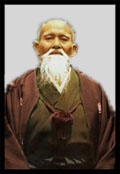Onegai Shimasu and Domo Arigato
The phrases Onegai Shimasu and Domo Arigato Gozaimashita are one of the first that the student of Aikido learns. These are phrases used every day in the Japanese language and are used as part of the tradition of martial arts.
The phrase Onegai Shimasu is difficult to translate into English or Greek. The second part, shimasu, is basically the verb suruwhich means “to do” in the present tense. Onegai is derived from the verb negau, which literally means “to pray to something” or “to hope for something to happen”. The “O” at the front is a term of honor which makes the phrase more official –this does not mean that this particular phrase is ever said while omitting this letter, nevertheless this is its meaning. This “O” should not be confused with the “O” which precedes Sensei when we refer to Morihei Ueshiba (O-Sensei). This “O” is pronounced more like “Ou” and roughly means big (large).
In Japanese culture the phrase “Onegai Shimasu” is used in different circumstances. Its basic meaning is the transmission of good will with regards to the future of the two people between which it is exchanged. Therefore sometimes is may mean “I hope that our relationship bodes good things for the future”, while between the Japanese it is exchanged in the New Year as part of the phrase “kotoshi mo yoroshiku onegai shimasu” which roughly means “I hope to do good things this year”. This is its meaning more or less.
Another meaning is that of a polite request, as for example: “please allow me to practice with you”. It is a request often used in order to ask someone to teach us, showing that person that we are ready to accept his teaching. If one feels truly humble one may use the phrase “onegai itashimasu” which uses the form “kenjyougo” – i.e. the most ‘humble’ form of the verb. The use of this phrase places the person using it in a lower position in the hierarchy from the person to which it is being addressed, except in the case when he in turn uses the same form, in which case the exchange may degenerate into a “humility match” similar to who is “bowing the lowest”.
For the pronunciation of this phrase, this could sound like: O ne ga-i si ma su. And if one wishes to give greater emphasis to detail the final “su” is less coherent and sounds more like “ss”.
The phrase “Domo Arigato Gozaimashita” is easier to explain. Basically it means “thank you very much” and each word translates as follows:
Domo : thank you
Arigato : thank you (yes, once more –the Japanese are somewhat pleonastic: i.e. use more words or word-parts than necessary for clear expression)
Gozaimashita : for something that has happened
For the pronunciation of this phrase, this could sound like:Dou mo ari ga tou go za-i ma si ta
If one is addressing someone else who is perhaps ‘lower’ than themselves in a hierarchy one could say simply “arigato” or “domo”, although the simple “domo” is rougher and may be perceived as impolite –something like “thanks”.
If someone is higher in the hierarchy (e.g. Sensei, sempai) it is more correct to us the whole phrase; if part of the phrase is be omitted it is best to omit “domo” and simply say “origato gozaimashita”.
Note: In order for the meaning of the phrases to be clear, we have included in the above explanation the interpretations given by Japanese Aikido practitioner Jun Akiyama in the web site created for Aikido, AikiWeb. The original texts are at: http://www.aikiweb.com/language/onegai.html and http://www.aikiweb.com/language/arigatou.html respectively, and they have been translated by members of the HAA, following permission by Mr Akiyama himself.



 FukuShinKan Dojo, 12 Davaki st.and 18 Mylpotamou st., 1st floor
FukuShinKan Dojo, 12 Davaki st.and 18 Mylpotamou st., 1st floor Hellenic Aikido Association on facebook
Hellenic Aikido Association on facebook Hellenic Aikido Association's YouTube channel
Hellenic Aikido Association's YouTube channel